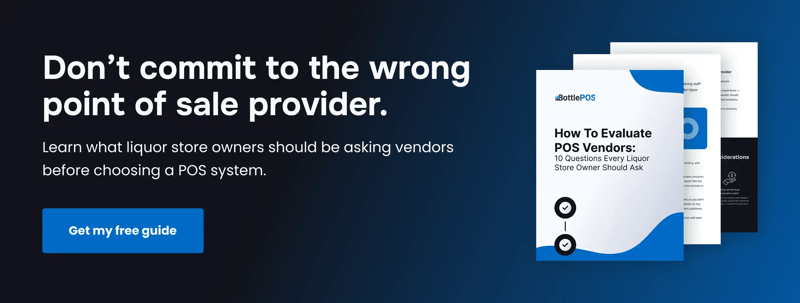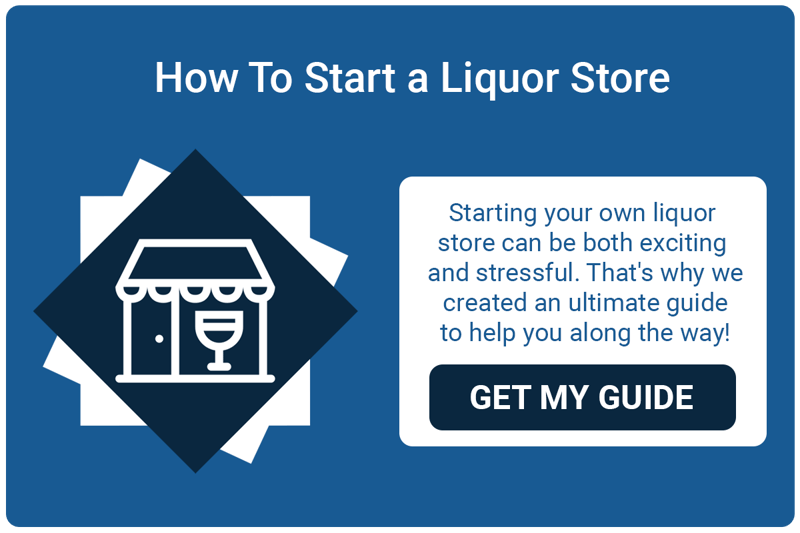Many people dream of owning a small business.
Small business ownership brings the opportunity to carve out your unique path to success, make meaningful connections with lifelong customers, and build something that you can be proud of.
As an aspiring entrepreneur, you’re probably interested in the financial reality behind this dream. If you launch your own liquor store, how much will you make? What does it take to be profitable in the liquor industry?
In this blog, we’ll talk through all the factors that affect your liquor store’s profitability — and how much you can expect to bring home at the end of the day.

How Much Does a Liquor Store Owner Make? The Data
Average store owners can expect to take home between $70,000 and $250,000 annually.
Why the huge difference? How much a liquor store owner makes depends heavily on the store’s overall financial health and revenue. Some experts estimate liquor store annual revenue as:
- $300,000 to $600,000 in less-trafficked or more rural areas
- $840,000 to $1,200,000 in high-traffic or urban areas
Your take-home salary as an owner will then depend on your profits after expenses like:
- Monthly inventory costs
- Leasing costs and utilities
- Employee salaries
- Business insurance
- License fees
- Technology costs

Most stores have a 20% to 50% profit margin, which can vary depending on what types of alcohol make up the bulk of your sales. Since bottles of liquor and wine fluctuate from cheaper staples to rare delicacies, the potential profits are also higher than beer, ready-to-drink cocktails, and other similar items.
Factors That Determine Liquor Store Earnings
The complicated (but most accurate) answer to the question of what liquor store owners make is, “It depends.”
Your salary as a small business owner will be based on your store’s overall financial success, and your liquor store’s potential to make a profit is influenced by several factors. If you’re in the early stages of opening a liquor store, these are key considerations:
- Location: Your earnings will vary based on whether your store is in a rural or urban area. Also, stores in higher-traffic areas will generally see more sales but incur higher expenses, such as rent and utilities.
- Product selection: The types of bottles you carry will impact your profits. Some liquors, beers, and wines can be marked up more than others, generating more revenue. Also, profit margins aside, stocking a wide variety of products can help draw in more customers.
- Store size and staffing: A small liquor store might have a limited selection but will have a cheaper lease and require fewer staff to keep the business operational.
- Competition: The presence of other liquor stores in your area can impact your small business’ success, meaning you’ll have to find ways to make your store stand out.
- Operational efficiency: The more you can streamline daily processes and optimize inventory levels, the more you’ll reduce costs and boost profits. Spending hours on manual invoicing and inventory counts reduces the time spent with customers and often requires extra staffing hours.
- Marketing and customer retention: Your ability to attract new customers to try your store and keep old customers coming back will have a significant impact on your business’ long-term financial health.
Making strategic decisions about where your liquor store should be located, how much space you need, and what role you hope to fill in your local liquor market will put you on the best possible path to success.
How Much Should You Pay Yourself as a Liquor Store Owner?
We’ve covered the average salary data and the factors that will affect how much you can make as a liquor store owner, but how much should you be making as a liquor store owner?
Most small business owners approach their personal salaries in two ways.
If you spend most of your time in your liquor store, you may want to consider paying yourself a fixed salary and treating it as a business expense. If your liquor store is more of a side business and requires less time and effort from you, a percentage-based approach may work best.
Fixed Salary
The first way is to pay yourself a fixed salary. Estimate your annual earnings and monthly cash flow, then pay yourself a fixed amount per pay period.
Many entrepreneurs like this strategy because it gives them the financial peace of mind that comes with a predictable income — which then allows them to focus all their energy and care on making their business successful.
Better yet, because your personal and business assets will be separate, you’ll have a lot less work to do when calculating your tax liability at the end of the year. This is made even easier if you use payroll software to calculate withholding automatically.
However, a fixed salary can be risky, especially if your business is new and your cash flow is sporadic. It’s also harder to adjust if you have sudden down periods.
Profit-Based or As-Needed (Owner’s Draw)
The second method is to pay yourself a fixed percentage of your store’s overall profits or to withdraw money from the business as needed (also known as an “owner’s draw”).
In this approach, you calculate all your expenses, subtract them from your total revenue, and then pay yourself a portion of the remaining profit. You can also assess regularly and pull out personal expenses as needed.
Let’s walk through an example of this method.
If your liquor store brings in $200,000 annually and your expenses are $120,000, you’ll be left with a profit of $80,000. If you’ve decided to pay yourself 60% of your profit, your annual salary will be $48,000.
Related Read: ANSWERED: What Affects Your Liquor Store Profit Margin?
This method is popular because it provides more flexibility for business owners, as they can adjust their draw on the fly based on business performance. However, it’s also not as consistent, making it harder to plan both your personal and the business’ finances.
Last, because you won’t be deducting taxes from your pay immediately, you’ll need to track your quarterly payments and self-employment taxes.
Checklist: Review Key End-of-Year Items For a Smooth Transition

Tips for Boosting Your Liquor Store Profits
Whether you’ve been in business for years or are starting a brand new store, there are many actions you can take to boost your profits.
Here are some practical (and cost-effective) tips you can implement at your store today:
1. Leverage Technology To Simplify Daily Processes
Prices have steadily risen over the past few years, and customers are looking for stores that offer fantastic customer service and selection. Both of these are hard to focus on when you’re spending hours or days on manual invoicing and stock counts.
Liquor store point of sale (POS) systems are empowering small and independent businesses to stay competitive and improve the shopping experience by simplifying or eliminating tedious daily tasks.
Liquor POS software helps stores focus more on selection and customer service through:
- Automated invoicing and stock updates
- Real-time inventory tracking and low stock alerts
- Detailed sales and inventory reports
- Barcode scanners for quick inventory counts
- Built-in employee management
- Integrated age-verification and ID scanner support
More efficient processes will allow you to significantly reduce the amount of time you spend on admin, freeing you up for more customer-focused tasks.
2. Optimize Your Inventory Levels
Recurring inventory costs are, by far, one of the biggest liquor store expenses. Ultimately, a liquor store’s profits are defined by its stock, and the more ways you can find to optimize stock levels, the better.
First things first, use the vendor and inventory management tools on your POS system to set reorder thresholds. Many systems, including Bottle POS, include automated low stock alerts that activate based on an item’s sales history and supplier lead times.
That way, the second an item runs low, you can quickly reorder the right amount at the right time to avoid over- or understocking.
You can also use daily sales reports or auto ranking features to quickly identify your best sellers and which items need help.
3. Upgrade Your Marketing and Customer Retention
Your business won’t grow if you can’t bring in new customers. More importantly, once a customer comes in, you need to keep them coming back for more. Why? Because repeat customers spend over 60% more than new customers.
Marketing is key to both attracting new customers and retaining old ones. Regularly run promotions and discounts to keep people on their toes and tempt them with a great deal. You should also run themed promotions around holidays, game days, and other events.
However, no one will take advantage of said deals if they don’t know they exist. Advertise your promotions on your website or social media to get the word out. Posting on social media is also an easy way to give your store a personality and share your expertise.
You can also encourage people to come back through a customer loyalty program. Customer loyalty programs let people earn points every time they purchase, which can be redeemed for discounts or freebies later on.
Once your loyalty program grows, you can look at the purchase history of loyalty members to understand which products your returning customers love the most, helping you refine your product list and make better business decisions.
4. Find Your Niche
One of the biggest advantages of running a liquor store is that, due to zoning laws, there isn’t as much competition as other retailers. But that doesn’t mean you can afford to get complacent.
As liquor store e-commerce becomes more popular and prices rise, people are getting pickier about where they buy liquor. By understanding your customers’ preferences and defining your niche, you can rise above being “just another liquor store” and become a go-to destination.
First and foremost, follow your passions. If you love and know a lot about wine, then expand the wine section of your store. If you have a passion for local craft breweries, then start connecting with local suppliers.
Offer recommendations both in person and through signage to share your expertise and get people excited about what’s new. As prices rise, an expert recommendation from friendly staff can be an extremely effective way to sell high-end items.

Additionally, use the sales reports on your liquor POS system to see which product categories your customers gravitate towards the most. This will indicate other areas where you should expand your selection.
Set Your Liquor Store Up for Success
Since your earnings will depend on your small business’ financial health, it’s in your best interest to make your liquor store as profitable as possible.
If you’re looking for a liquor store POS solution that can grow your business, look no further than Bottle POS.
Bottle POS is an all-in-one point of sale solution that has all the tools you need to help your liquor store thrive, including powerful inventory management features, a built-in customer loyalty program, detailed reporting, and an e-commerce platform to help you make sales online.
Schedule a live demo today to see how Bottle POS can make a difference in your small business journey.
